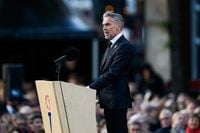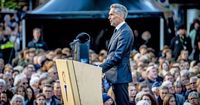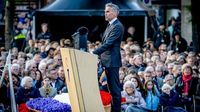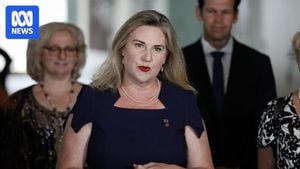On May 4, 2025, Premier Dick Schoof delivered a poignant speech during the National Remembrance Day ceremony held at Dam Square in Amsterdam, reflecting on the significance of remembrance eighty years after the liberation from World War II. In his address, Schoof emphasized the importance of recognizing the past and its implications for the present, urging attendees to contemplate what remembrance means in their own lives and choices.
"In a world full of war, people lose sight of each other and lose compassion, even in the Netherlands," Schoof stated, highlighting the necessity of maintaining empathy amidst global conflicts. He noted that the echoes of history resonate particularly loudly on May 4, during the two minutes of silence observed to honor the victims of the war. "On this day, in the two minutes of silence, that echo sounds extra loud," he remarked, encouraging those present to reflect on the lives lost, including those who perished due to hunger, exhaustion, or while fighting for peace and freedom.
During his speech, Schoof also shared a personal story about his grandfather, Wim Pommerel, who was executed by the Germans shortly before the liberation for his involvement in establishing an illegal network of telephone connections during the war. "One of the dead we commemorate today is my grandfather," Schoof revealed, adding that he had only recently learned more about Pommerel's legacy. "Now, only in recent years have I come to understand more about him, as this was not spoken of in our household before."
The ceremony, however, was marked by protest. Several dozen attendees turned their backs to Schoof during his speech, a demonstration organized by activist Frank van der Linde. Van der Linde had called for participants to come to Dam Square not only to honor the dead but also to send a clear message that the phrase "never again" must not be empty words. This protest was aimed at expressing discontent with the current government, which van der Linde accused of complicity in the ongoing violence in Gaza.
Despite the protests, Schoof's address resonated with many. He invoked the memory of individuals who, during the darkest times of the war, chose to act with humanity and compassion. "It was my mother who taught us, despite her own sorrow, to look at others with love and compassion, even if they were different from us," he recounted. This lesson, according to Schoof, was vital not only during the war but also in today's world, where understanding and empathy are increasingly challenged.
Reflecting on the significance of the day, Schoof stated, "It is that echo that brought you and me here today to Dam Square. Or at home, in front of the TV." He underscored the need for collective remembrance, as it serves as a reminder of the sacrifices made for freedom and peace. He urged those present to carry forward the lessons learned from the past into their actions and decisions in the present.
The National Remembrance Day, which takes place annually on May 4, is a tradition that commemorates the victims of World War II, particularly those who lost their lives in the Netherlands. The event is held at a site steeped in history, where many resistance fighters were secretly executed during the war. This year, the ceremony was particularly poignant, as it marked the 80th anniversary of the liberation.
As the ceremony concluded, the crowd observed a moment of silence, allowing the echoes of the past to resonate deeply within each individual present. The significance of remembering those who fought for freedom and against oppression was palpable, as attendees reflected on the sacrifices that paved the way for the liberties enjoyed today.
In a world increasingly fraught with conflict and division, Schoof's message of compassion and remembrance serves as a vital reminder of the importance of understanding history and its impact on contemporary society. His call to action encourages individuals to not only remember the past but to actively engage in fostering empathy and humanity in their daily lives.
As the echoes of history continue to resonate, Schoof's speech at the National Remembrance Day stands as a testament to the enduring significance of remembrance, urging all to reflect on the choices made in the present and their implications for the future.






